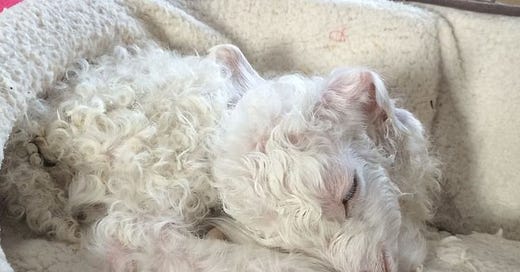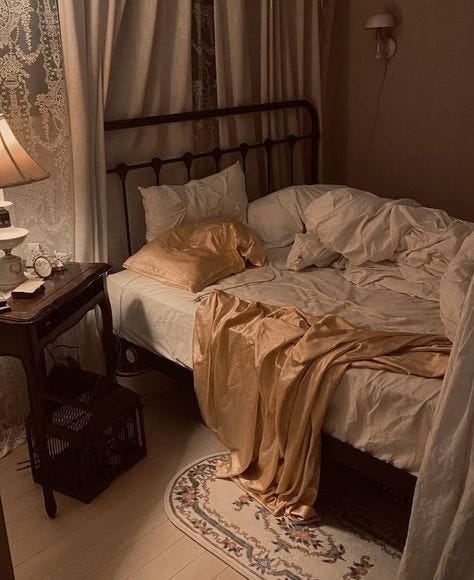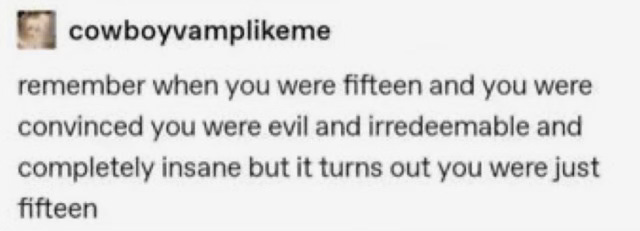it’s remarkable how long something can hold you down.
What no one tells you about deconstructing your faith, about untangling trauma, is that it’s twofold. On one hand, the memory remains; it lingers. I can’t shake it fully.
It’s been several years now since I stepped back from Catholicism, but its roses still bloom inside me. They’ve just shed a few thorns.
When I moved into my studio, the first thing I did was unpack the small Bible my mom insists follows me everywhere. I opened it to the creased middle pages. I couldn’t tell you what they say; it’s been ages since I’ve read it. Still, I tucked it beneath the weight of my mattress, sliding a rosary—my own—inside before letting the bed come down over it.
The rest of my belongings lay smeared across the floor in my rush to settle these first. My oldest sister watched from a chair by the window, gazing out at London’s September skin, as I used what little strength I had after a ten-hour flight to place God beneath my bed.
At the start of that same flight, I whispered a Hail Mary in my head, as I always do when I fly. I’m terrified of planes—though it’s eased a bit—and that familiar routine still steadies me in ways my anxiety meds can’t. It’s mostly the takeoff that unsteadies me, which is ironic, given how close it brings me to Heaven, a place I once sought more than anything.
Before all that, before the plane even lifted, I lit my Mary candle one last time. Whenever I’m home, I make my ritual visit to the Dollar Tree and buy two candles: the Virgin Mary for myself, and Saint Jude for my mom. I usually keep mine in the bathroom, the pink glass glowing softly in the mornings, flickering in its smokeless silence. The flame feels oddly soothing, its scentless glow lingering.
One thunderous night, when the power went out around 3 a.m., I crept downstairs to grab a lighter and my dog. Tucking him under the covers, I slipped into the bathroom to light the candle. It was the only light in my room as we curled up together, and somehow, I felt at peace.
My mother keeps it burning for me while I’m gone.
So you see, it’s all still in me—well-ingrained, and, despite my deepest struggles, well-loved.
And yet, in the other hand lies the anger.
I don’t know why it took me so long to realize Catholicism would leave its mark on me. I was nine years old, sitting outside the confessional booth, scrambling to recall every little mistake so I could receive the “proper” punishment and, eventually, forgiveness.
How much could I really have done wrong at nine? My greatest offenses were probably not listening to my parents, being cranky, or snapping at a friend. Typical things for a kid my age.
But there I was, wrapped in my burgundy cardigan, buttoned over a crisp white shirt my mother had ironed for me, tucked neatly into the (sometimes rolled) waistband of a plaid, pleated skirt.
Even now, I remember it all so vividly that my throat goes dry, and my mind feels hazy. I’d walk into a makeshift confessional—usually just an empty classroom transformed for “holy” use—and sit across from an older man who tried to seem kind but only made me uneasy.
I didn’t have the words then, but something in me knew this wasn’t right. Here I was, at nine, aiming to restore to my “purity”—and I knew, somehow, it would haunt me.
The urge hasn’t eased up, not even now, and it probably peaked in high school.
I am my own worst enemy when it comes to performance.
There's always been this phantom audience in my mind, a constant, scrutinizing presence that convinces me I’m being observed, examined, at all times. It’s both helped and hurt me. And perhaps because of my Mother Wound, I found myself gravitating toward female teachers, latching onto their praise as though it could fill a deficiency inside of me.
I became the favorite, and I adored it. I worked hard to keep it that way.
But it also meant that mistakes gutted me in ways that seemed foreign to others. I never understood why people didn’t care as much as I did. I envied those who could brush things off with ease, but I knew I’d hate myself if I ever did the same.
Now that I’m older, I can connect the dots.
After spending kindergarten through eighth grade in the grip of Roman Catholicism, you end up with a complex. From an early age, I was terrified of missteps, terrified of damning myself at any moment.
I aimed to be the good girl. Good at school, good to people—even when it meant letting them take advantage of me. I convinced myself that as long as I was pure, I would be okay. That it was that simple, and that somehow, I’d figured it out before anyone else.
But I hadn’t accounted for anger, or desire, or being queer. What did Lana say in that one song?
We had a deal and I fucked it up when / I made the decision to become someone
The anger didn’t even feel like anger at first. I didn’t know what to call it. But it was potent.
I began dozing off in the chapel during morning church—probably not helped by the fact that I rarely ate a balanced breakfast. The highlight of the hour became guessing which choir member might collapse next from the heat—or, looking back now, from an eating disorder.
It became harder to recognize my anger, especially since that warmth in my stomach would also surge when I looked at girls a bit too long. My eyes would catch on their thighs and hips in the locker room, and I’d blush whenever my (now ex) best friend complimented me.
I discovered pleasure—and that it wasn’t confined to men. Then I’d sit through hours of theology, forced to listen to lectures about the sanctity of life and heterosexuality.
The peak came in seventh grade when we all had to write pro-life essays for a contest with cash prizes. My best friend was told her essay sounded too neutral, but at thirteen, we barely knew enough to condemn anyone.
Occasionally, a priest would come in and allow us to “ask questions” which had invisible rules attached that we knew. I began to strain against them, asking why asking why women couldn’t preach if Mary could carry God inside her.
I never got an answer, which only fed the fury.
I confided in a Sister I was close to, asking if liking the same sex was a one-way ticket to hell. She told me no, as long as I didn’t give in to my urges. I thanked her, fighting the urge to cry in the bathroom. Destined never to be loved, I would have to make do.
These moments, though, were interspersed with glimpses of love and joy. There was a garden out back, accessible through the stained-glass door in the library, which we’d populate during recess. Hordes of girls pressed together among throngs of irises and wild grass, a faintly gurgling fountain clogged with mud and insects but still beautiful.
We’d watch the distant figures of boys on the field, playing soccer or football, as we loved and hated one another. We’d gush over clothes we wanted, the jewelry we had, the parties some dared to sneak out to. Never me—I was Caribbean, and sneaking out would have meant an early grave.
It was around then that I discovered Lana and Lorde. I begged my dad to stop at a rundown CD shop out south while on a road trip, somewhere I can’t go anymore, and bought Melodrama. I played it on repeat late at night until my radio went to shit, and I could no longer dance.
My best friend and I were inseparable. Everyone knew we came as a pair. I was the outgoing one, bringing people to us, and she would settle in perfectly. That was our dynamic.
We were quiet, resilient, surviving in ways that would inevitably collapse—homoerotic friendships and fallouts, eating challenges, fights with our mothers, roaming online spaces our young minds weren’t ready for.
I thought I could make it. But in the end, I had to let it go. Or at least begin to. Because my mind was unraveling, and no one else seemed to be hurting quite like I was.
First came the work of reshaping the imagery.
I had to release the God of my childhood and awaken the God of my womanhood. I began to replace “him” with “her,” then “Him” with “Her.” I knew some might see it as blasphemous, but it made praying easier—something I wasn’t ready to lose.
After all, if I looked at it objectively, I couldn’t even be sure any of this was real. I’d taken all the sacraments, walked the path, all without knowing where it led. I was placing a portion of my faith into it, something small but vital, to carry me through moments when I felt hollow.
It felt like waking up tangled in a spider’s web and standing carefully, my feet sticky as I navigated the threads. I took care not to break some of them but snapped others, creating space for new weaving.
God became synonymous with the universe, and I embraced the idea of a feminine universe—creation as a motherly force on a grander scale.
With this new image came a new sense of purity. I craved change, a way to redesign myself, mainly through the ideas of tattoos and piercings. But the world outside of my schooling said the same thing as the world within it: you weren’t clean with all that ink and metal.
Social media further hammered this point. The clean-girl influencers touted laser removal for the tattoos they regretted, turning back to religion to “purify” their lives, sometimes taking out their nose rings as a final step. It was easy to be drawn in again, until I remembered I had free will.
Fuck you, I thought and the curse was delicious. Someone with a nose ring has made it to heaven before you. And who are you to call anyone else dirty?
Gradually, I tailored my online spaces, and women like me started to appear. Tall, unyielding women with long dark hair, nails sharp, script woven along their skin in inked lines. Some had piercings all the way up their ears, their hair shifted back so you could see the diamond rows. This was my new norm.
They were beautiful and assured, admitting their mistakes with the grace of someone who had lived through the aftermath. They were as wild as me and made no effort to tame the wolf inside and, despite this, were still able to hold the lamb.
They taught me that when I felt raw and vulnerable, I could exercise control in other ways. I could dictate who had access to my body—not just in terms of intimacy, but in the boundaries I set. Who entered my space was my choice. I didn’t need to shrink or soften myself to be loved.
You could wake up and live through the next day. The goal was to try to be better and often, that was enough.
Spirituality became my grounding, and I’ve held to it ever since.
Others may judge, but I stick to what works for me. Since I was young, dreams have come to me, dreams that I now understand are visions—clear at times, murky at others, but always coming true.
I work with water and crystals, listen to protection frequencies, and still buy my Virgin Mary candle, pink and radiant. I’m even looking for a psychic I can go to regularly; I have a promising recommendation in New Mexico. ( Thank you to the angel that is . )
I pray every time I board a plane, after a nightmare, or whenever a wave of unease hits. Each time, it’s a Hail Mary. My sisters and I sage our homes, despite my mother’s horrified reaction.
That’s the new difficulty: the criticism.
My father doesn’t mind; he’s always said that church could be as small as the thin closet in my parents’ bedroom. But my mother has taken my sisters’ and my approach to faith the hardest. She interprets our distance from Catholic schooling as a rejection of the sacrifices she and my father made for us. Over time, she’s become more conservative, which is hard to reconcile with the woman who once encouraged me to believe without tethering myself to a single doctrine.
But I am grateful. I loved parts of those years—the friendships, the gentle slowness of childhood. But the impact organized religion had on my sense of self cannot be erased.
I’m wary of people who try to push their faith on me, whether through constant advice or relentless social media reels. I am not yours to fix, nor do I need fixing. Faith can take many forms, and I refuse to be shamed just because it doesn’t look like yours.
This is not to say I’ve figured it all out, or that it’s gotten easier. I’m living with it; it’s a daily process.
Sometimes what I’ve left behind can still reach me. I think about a cathedral wedding, but I know there’s only a fifty-fifty chance of that. I could end up with a woman, which wouldn’t be accepted. And I have no desire to undergo religious counseling to use the venue.
Yes, there’s sadness, but then I remember how I used to feel. I can’t go back to that.
So here I am, still threading through the spider’s web, staying faithful, staying kind, and staying true to my own mind. I wish I could go back to that little nine-year-old girl, or to my seventh-grade self waiting nervously outside the confessional.
I’d take her hand, look into her eyes—look at her—and say,
There’s nothing wrong with you. You’re thirteen.
I’d have given anything to hear that back then. It would’ve been Heaven to me.















i love the story that you told here. not only do i resonate with it on so many levels, but it really shows the malleability of something that the world tries to tell us is rigid and unchanging. i honestly respect so much your effort and emotional maturity to be able to change what it means to you and wrestle with the idea until you found how it can fit into your life (most people don't do this. most people just abandon it.) I have so many more thoughts but I just wanted to tell you how much I loved this piece :)
i never get sick of going through your pieces and collecting lines i cant wait for you to be published so i can keep a collection of annotated books by you.
"its roses still bloom inside of me. They just have less thorns." and "It’s mostly the takeoff that unsteadies me, which is ironic, given how close it brings me to Heaven, a place I once sought more than anything." and "I am my own worst enemy when it comes to performance." and "at thirteen, we barely knew enough to condemn anyone." and "asking why women couldn’t preach if Mary could carry God inside her" and "God became synonymous with the universe" and "Someone with a nose ring has made it to heaven before you"
and then also the small pieces of metaphor/imagery like "London's September skin" and "the curse was delicious" just you have such a *voice* i always feel so captivated by your writing
and the ending!!! "There’s nothing wrong with you. You’re thirteen. I’d have given anything to hear that back then. It would’ve been Heaven to me." i started tearing up.
I've only recently started to also question my faith and beliefs (from a wildly different background - my family has always been very atheist) so it's very interesting to hear about the other side. i wish i could say something that would make everything make sense (for both you and me) but i think the most i can say is im glad we at least have the room to figure it out. "it's a daily process" like you said.
+ i love how you're always so open and vulnerable in your writing. in the least (or maybe most?) parasocial way, you are one of my favorites on this platform